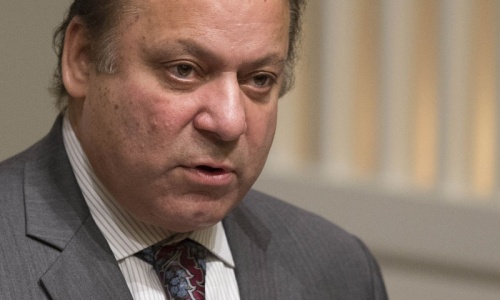COLOMBO: Sri Lanka's president urged his peers Friday not to pass judgment over his country's past as he hosted a Commonwealth summit that threatens to be upstaged by a visit to the war-torn north by Britain's David Cameron.
The summit was meant to be a chance for President Mahinda Rajapaksa, a Sinhalese nationalist leader who oversaw the crushing of Tamil Tiger rebels in 2009, to showcase the development of his country.
But after refusing to bow to demands for an independent investigation into the end of the conflict, Rajapaksa has been confronted by a public relations disaster.
The leaders of Canada, India and Mauritius have all snubbed the meeting and British prime minister Cameron's visit to the Jaffna region is designed to shine a spotlight on the plight of war victims.
But in an opening speech, Rajapaksa said the Commonwealth must not be a “judgmental body” and warned his fellow leaders of trying to impose their own “bilateral agendas”.
“If the Commonwealth is to remain relevant to its member countries, the association must respond to the needs of its people and not turn into a punitive or judgmental body,” he said in a speech ahead of the formal opening of the summit by Britain's Prince Charles.
Since the war, the economy has enjoyed growth rates of up to 8.2 per cent and more than one million tourists visited Sri Lanka last year — a new record.
But what was meant to be a chance to champion a new-look Sri Lanka has been overshadowed by the legacy of the war.
The prime minister of Canada, Stephen Harper, was the first to announce a boycott after his government said the summit was akin to “accommodating evil” while his Mauritian counterpart Navin Chandra Ramgoolam — due to host the next one — is also refusing to attend.
Even India's Prime Minister Manmohan Singh is staying away, seemingly preferring to jeopardise ties with a neighbour rather than offend Tamil voters ahead of next year's elections.
The agenda for the three-day summit includes sessions on debt restructuring and climate change.
But Rajapaksa has had to spend the build-up fending off allegations that his troops were responsible for the death of some 40,000 Tamil civilians in the final weeks of the war.
During an impassioned speech, the 67-year-old leader said his administration deserved credit for managing to bring an end to the conflict.
“We asserted the greatest human right — the right to life,” he said.
“In the last four years there has not been one single terrorism-related incident in Sri Lanka.”
At least 100,000 people lost their lives in the conflict which began in 1972. The northern Jaffna peninsula, home to around 800,000 Tamils, was the main battlefield.
Before the war, Jaffna had a flourishing economy — second only in terms of wealth to Colombo.
But its towns and villages are now littered with shelled-out buildings, interspersed with abandoned farmland. Some 30,000 people still live in refugee camps.
Cameron has taken some flak for not joining the boycott but he promised Nobel laureate Aung San Suu Kyi this month that he would witness Jaffna's fate first hand.
He will thus become the first foreign leader to visit Jaffna since the former British colony gained independence in 1948.
Although there is no official word on his program, civil society representatives in Jaffna said they had been told to expect Cameron on Friday afternoon — only hours after the summit opens.
He can then expect a frosty reception when he meets Rajapaksa back in Colombo in the evening.
Cameron has said he would have some “tough conversations” with Rajapaksa but the Sri Lankan leader says he has some questions of his own.
Speaking during a stopover in India, Cameron reiterated his calls for an international investigation into war crimes allegations, which has also been a demand of several UN bodies.
“There needs to be proper inquiries into what happened at the end of the war, there needs to be proper human rights, democracy for the Tamil minority in that country,” he said.
At the last summit in 2011 in Perth, Commonwealth leaders drew up a charter of common values which committed members to respecting human rights.
But Human Rights Watch said the 53-nation bloc “risks its credibility ... if it doesn't publicly press Sri Lanka on its rights record and the lack of accountability for wartime atrocities.”
In his opening speech, Prince Charles said he felt “privileged” to be representing his mother Queen Elizabeth II, the titular head of the organisation.
“The Sri Lankan people have confronted great adversity,” said the prince who also recalled the devastating impact on the island of the 2004 tsunami.














































